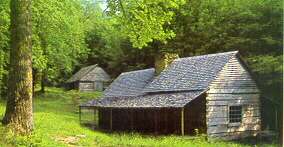Echoes From The Past
By JUDY MAUPIN
*- Echoes From the Past
(A Column of historical and genealogical anecdotes, stories and family notes.)
Calloway County, Ky.
Early Life in Southern Illinois
Mar 22, 1980
I am always interested to read journals and diaries kept by people from the past. These daily logs of everyday events recount the many details of pioneer life that we of this modern age know so little about and are, at least to me, endlessly Interesting.
One particularly fine example was recently loaned to me by Mrs. Alice Koenecke, head of the Home Economics Department at Murray State. It was the autobiography of Mary Hallock Shearer and her life In the little Quaker community of Frlendsvllle, near Mount Carmel, Illinois.
For the next few weeks, I am going to excerpt incidents from this diary. It was difficult knowing where to start, because the whole thing was well written, especially considering that it was written in 1899 by a woman who more than likely had a rudimentary education.
Today I'd like to start with her description of her mother, because It not only depicted the life of a frontier woman with its many hardships, but was also a very poignant description of a woman's deep affection for her mother.
"I am anxious to give as true a
representation of mother as I have of father, but the same difficulty arises. Having experienced so much of her goodness, in the gratitude of my heart for such a mother I may be Inclined to magnify her amiable qualities and touch lightly any failings she may have had. She was born Jan. 15, 1829 and was married May 5, 1842 and moved at once
to a home, consisting of her husband, his brother Richard and their father
and three aunts - four quite old and feeble persons. Which fact of itself must have required some resolution, a great deal of obliging kindness and patience.
Her love for father and her good natured disposition enabled her to do what only one person In a thousand could, discharge her duty to them all, In a manner to win their love and respect.
There Is much I could add here about her, but I will only add here that she had more Ingenuity in the use of carpenter tools than any woman I ever knew. One summer she made a little wagon for her little boys to play with and bring in wood - she sawed off a small log four pieces for the wheels -made good running gears and tongue and had a box for a bed - they used It for a long time. Then she would take a large dry goods box and make shelves
In it for holding bed clothes and other things and make wash stands with curtains and several other contrivances to help out in the furniture line.
"In our mother's bedroom all Father's fifteen children were born. Both of our dear mothers breathed their last there and in these two rooms cluster the sweetest most precious memories of my early life. But the "busy bustlIng days" may contain more of general interest to the reader.
"As I have already given a pretty good idea of father's occupations and the men's work, I will now speak of the housework, when went on with much unIformity year after year, varied by an occasional visit of mother to her relatives and a new baby every two years.
I am not sure which season brought the hardest work, winter or summer. In the early spring there were perhaps fewer men to cook for, but in May the housecleaning and gardening which
Mother took much interest in was followed by harvest and the ripening fruit that had to be taken care of, drying corn and the applebutter and peach and plum butter on to October filled all the days.
Soon now commenced the winter sewing, though to tell the truth, there was never any let up, on the everlasting sewing, renewing the clothing that her large family required, and overseeing the preparing of the food and other duties, kept Mother very busy all the hours that she was not In bed; and I guess that she slept wltn one eye open, she was so often disturbed in her rest by the requirements of her little children.
"One thing that she broke off from and that was spinning, though most of the neighbor women still kept It up. But the great amount of sewing that had to be done by hand those days kept woman in a kind of slavery.
"There were seven or eight beds that added to the wearing of clothes made very large washings which with the Ironings, took two or three long hard days of work for them. The baking days two and three times a week and the Saturday cleaning up gave her scarcely any time for rest.
"Mrs. Brines on a visit made this remark to mother, "How do you manage to keep them all filled up?" Yes, how did she manage those 17 eventful years to keep us all "filled up"
body and soul too? All we knew is that she did it like the best and kindest wives and mothers had done before her and after her to the very best of her ability -but the strain was very great, and all too soon her weary hands were folded across her silent bosom and the "filling up" process was carried on by other willing hands that in their turn were laid on a pulseless breast, and another wife and mother entered the great unknown, leaving little children to reach that goal as best they could without a mother."
Next week, I will pursue the journal of life in the early days of Southern Illinois.

